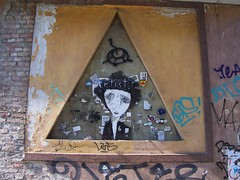THE PLACE directed by Paolo Genovese (Italy, 2017)
 At the time of writing, The Place is the most popular movie in Italy outperfoming blockbusters like Thor Ragnarok and Justice League.
At the time of writing, The Place is the most popular movie in Italy outperfoming blockbusters like Thor Ragnarok and Justice League.
In terms of budget, plot and special effects it couldn’t be further from these Marvel spin-offs. The whole movie consists of dialogues in a single location, a bar in Rome which appears never to close or else allows customers to remain for 24 hours a day.
Instead of of rip-roaring action we are drawn into the set of stories that subtly overlap and gradually reveal common threads.
The film is adapted from the US drama series ‘The Booth At The End’ which ran for two seasons and consisted of ten 23 minute episodes. As in the TV version, an unnamed man (brilliantly played by Valerio Mastandrea) receives visitors at his table in the corner of a bar and advises them individually on what they have to do to realise their dreams. His motives remain unclear – he asks no money for the service and the source of his wisdom is never explained.
His ‘clients’ include a nun who wants to revive her faith, a blind man who wants to regain his sight, a father wants his son to be cured of cancer, a mechanic who wants to spend the night with a calendar girl and a young woman who wants to be prettier.
The man writes down the specifics of these requests in a notebook and from the same ledger identifies a specific action they must undertake if they to turn their desires into reality. So, for example, the nun must get pregnant. the blind man must rape a woman. the father must kill another child and the young woman must commit a robbery.

Valerio Mastandrea as ‘the man’ – part priest, part therapist, part devil.
The demanding and/or illegal nature of these tasks means that these men and women are confronted with moral dilemmas of the most extreme kind.
The tag line for the TV series was ‘How far would you go to get what you want?’ and the man challenges them (and thus we the audience) to consider to what extent the ends can justify the means.
Implicit to the suggested courses of actions is that our fates are in our own hands so long as we are prepared to disregard questions of good versus evil and are prepared to defy ethical conventions.
The man adopts the detached, impassive bearing of a priest hearing confessions or a therapist listening to the psychological traumas of his patients. The agreements he makes are akin to Faustian pacts but, since they can choose to accept or not, it seems doubtful that he is the devil incarnate. When asked by the nun if he believes in God, the man replies evasively: “I believe in details”.
Sabrina Ferilli plays a stereotypically sexy waitress who is intrigued to know what he is doing every day. The man is immune to her flirtations but what he lacks in carnal desire he makes up for in his appetite for food – he eats almost continually.
Director Paolo Genovese’s previous film was the highly successful and very entertaining ‘Perfetti Sconosciuti’ which also explored the moral dilemmas and secrets that lurk behind the surface of ‘ordinary’ lives. Genovese employs many of the same cast for ‘The Place’ and a similar theatrical format but, while the acting is first rate, it has a far darker subject matter.
‘What kind of shit film is this?’ muttered a woman in the seat behind me and I imagine there are many who leave the cinema feeling they have been somehow cheated out of the entertaining experience they were expecting.
Given the unusual nature of this movie, I didn’t expect it to answer all the questions it raised but even so the ambiguous ending was much weaker and more contrived than I’d hoped. Consequently I’d give it 8 out of 10 for ambition and 5 for realization.







